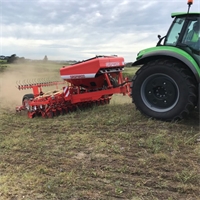28Feb
The Special Power of Oats
Following tough summer conditions, forage oats for fast grazing can be a get out of jail card for most farmers looking for quick feed in late autumn, while May and June sown oats provide valuable winter ground cover and an early spring silage opportunity. Oats also have a special power when it comes to catch cropping, being able to soak up excess nitrogen which can present a risk of leaching in fallow soil after the grazing of a winter crop such as kale or fodder beet.
Milton oats are a great option for quick, high quality feed. With their ability to tolerate cold soils, Milton oats can establish quickly while soil temperatures are declining in autumn, or alternatively sown in the middle of winter if planted as a catch crop once the winter crop has been grazed. Tom Kidner from North Green Arable near Rakaia experienced this when he sowed a paddock of Milton oats for green chop cereal silage on 25 July. “I was amazed how quickly the Milton’s got up and going considering we had snow on the ground five days after drilling,” said Tom, whose Milton oats paddock was cut on 5 November where it yielded 9.3 t/ha.
Harvesting date is crucial for determining the quality of oats if being grazed or taken for green chop cereal silage. Milton’s have good levels of energy, sugars, crude protein and digestibility when harvested at the booting stage (before the seed head is out) however if the crop gets beyond this stage the quality will drop dramatically.
Recent research from Lincoln Agritech has shown that sowing a catch crop such as oats in winter after grazing winter crops, can significantly reduce nitrogen losses by up to 49% compared to soil that has been left unplanted1. These crops can also be useful in providing ground cover for weed control and soil stabilisation as well as helping to increase the total annual production.
If considering oats as a catch crop the following points are important:
- Getting the crop in early produces the best results – don’t delay!
- Where soils are friable and dry enough, direct drilling is the preferred tillage option as cultivation stimulates nitrification when soils warm in late winter/early spring
- Where soil conditions don’t allow direct drilling in the window available, tillage technology like the spader drill may be the best option
- Higher sowing rates (300 plants per m2 are recommended to get early canopy closure)
- There are times when conditions may cause difficulties and make the practice less effective, but an 80% success rate is realistic
Talk to your Environmental Specialist at your local Regional Council if you would like further information on current environmental guidelines within your specific catchment. Get in touch with your Ruralco Representative for more information on Milton oats as a catch crop or autumn sown option for winter feed.
1 https://www.lincolnagritech.co.nz/capabilities/capabilities-and-projects/catch-crops/
THIS PROMOTIONAL FEATURE WAS PROVIDED BY AGRICOM
Related

After surviving a brutal attack, Auckland cop DS Honey Chalmers has returned to her hometown, Waitut...
Read More

Calving will now be underway on most dairy farms, and there may well be some early lambs around on l...
Read More

A self-proclaimed “people person” Ruralco’s Retail Manager, Tina Thompson’s focus on helping cus...
Read More

To mark World Soil Day on 5 December, Ballance Agri-Nutrients Forage Specialist and no-till advocate...
Read More

It’s disappointing when ryegrass fails to live up to its promise, leaving farmers frustrated and we...
Read More

Driven by producing a quality product, not commercial gain, it’s Glen Whyte’s attention to detail ...
Read More